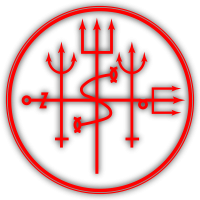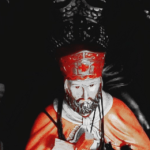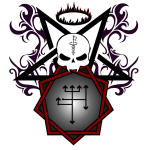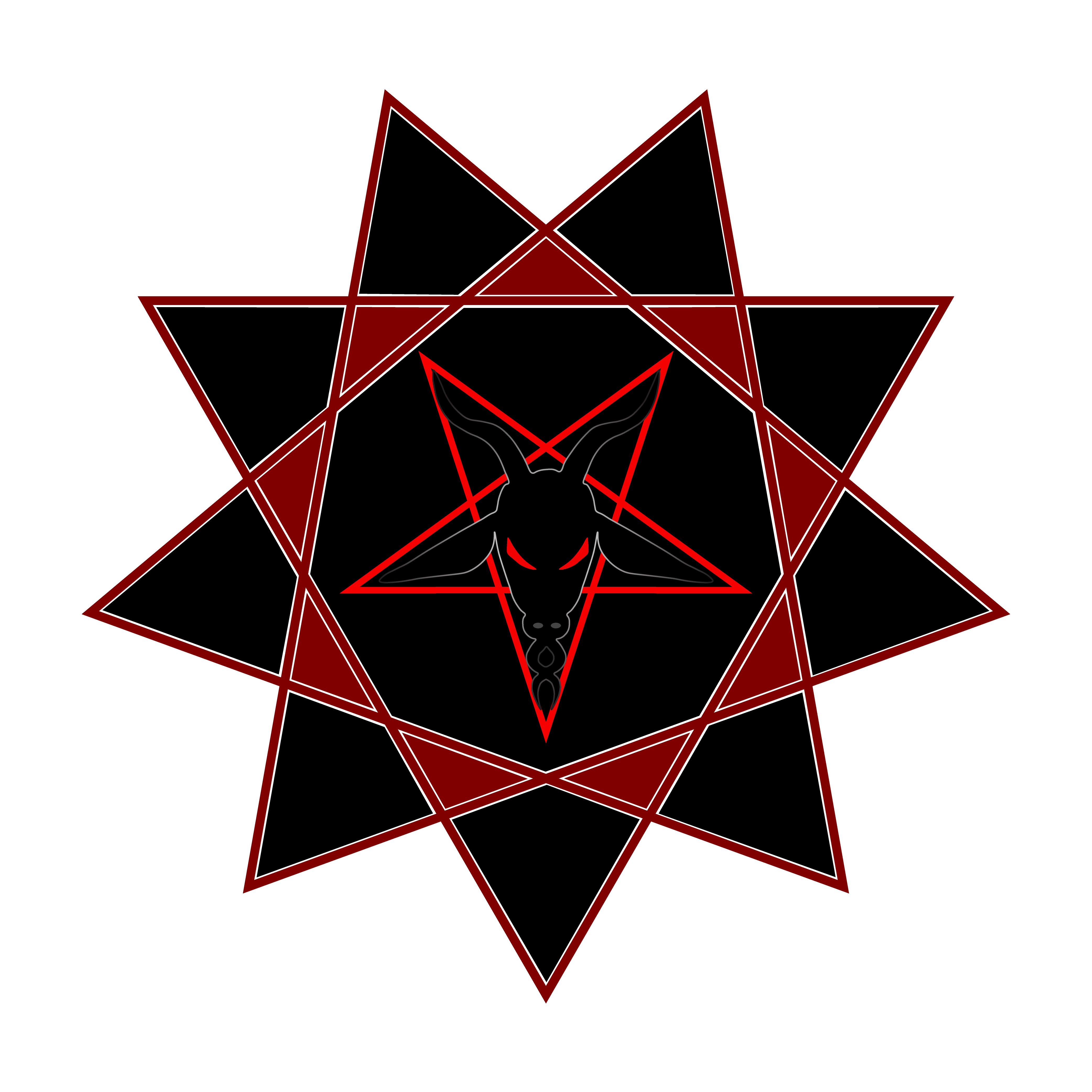The Weapons of Arte
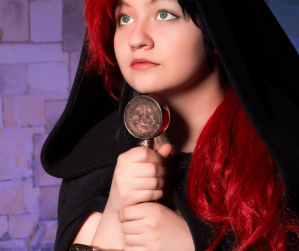
One can hardly imagine a literary Maga (or on film) at work without her wand or staff in hand as she re-arranges the elements of the world around her.
For the real-world ritual magician life can immitate art (at least on the surface). Magicians love magical tools, wands, swords, daggers, chalices, etc. etc. It’s all a big deal (and if properly executed, quite a business as you can imagine).
Further, magicians love to ascribe special properties and powers to their magical wares. There is allot of superstition here, but I’ve seen some shockingly tangible magical accoutreman as well. Like so much in magic: there’s a little something to it.
Going back to our fictional sorceress in the act. We see often that it is through the magical tool that such wonders are being effected. As if perhaps the wand itself is part of the equation and maybe even necessary for the magical acts.
In the real world of magical practice, the tools of the sorcerer are as magically potent as the sorcerer decides. An act of consecration for example, which is performed on a ritual tool to formally dedicate it to magical practice as well as magically bind it to the owner, can certainly imbue the object with a perceptible aura of potency, if the sorcerer wills it to be.
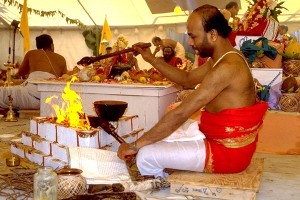
I have more recently experienced certain objects and materials that appear to be possessed of some magical virtue naturally, however such an item would still require the will of the magician to activate and personalize this latent potency so that it might be of some use magically.
Magical Tools of the Western Ceremonial Tradition
Here in the Western world, the default lodge mystery traditions like the Golden Dawn and it’s offshoots both actual and imagined, are positively enamored with magical tools. These folks accumulate enough magical tools from Neophyte to Minor Adept to justify a minor museum of unnatural art.
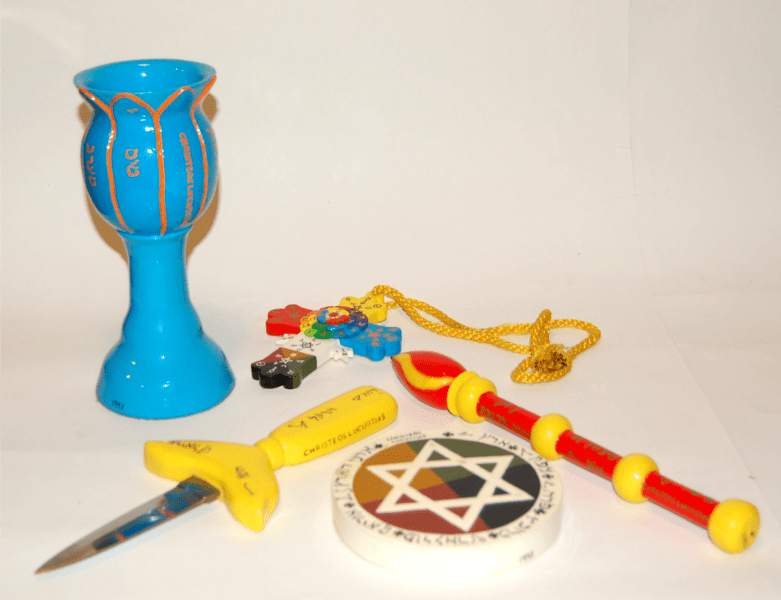
The Standard Magical Tools
In ritual magic, the idea is that each tool serves a special purpose in ritual. In the standardish traditions this would include:
The Altar: The platform upon which the magical tools rest, along with anything else related to the working at hand. The magician manipulating items that rest on the altar symbolically represents the magician manipulating various elements of reality.
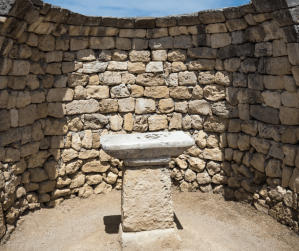
The Wand: Symbolic of elemental fire and therefore the Will of the magician. The wand being used to conjure those qualities in ritual.
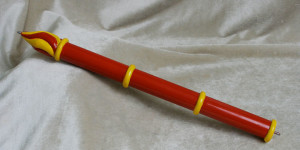
The Dagger: Symbolic of elemental air and therefore the cutting intellect of the magician. The power of investigation and dissection.
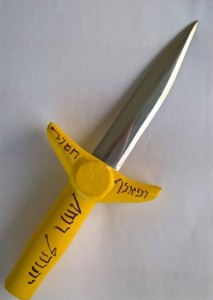
The Cup: Symbolic of elemental water and the emotional force of the magician. Also the magician’s power over the astral/aether.
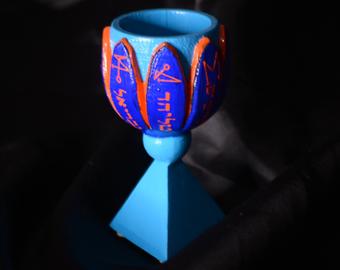
The Pentacle: Symbolic of elemental Earth, the forces of stability and manifestation. That which precipitates the subtle cues into the material world.
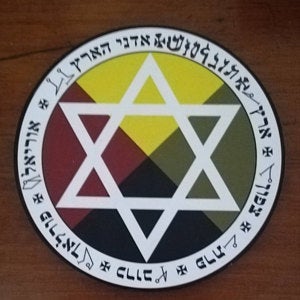
These elemental “weapons” would be standard fare in ritual, and in the more rigid traditions; absolutely essential.
In the Golden Dawn and its derivatives we could add many tools to this list. Two of my favorites are:
The Lotus Wand/Rainbow Wand: A beautiful magical tool for general purposes that would allow the magician to focus astrological forces to flavor their work.
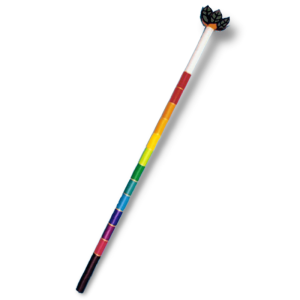
The Rose Cross Lamen: A well crafted Rose Cross is a work of art. Stunning to behold, and the mark of an Adept no less.
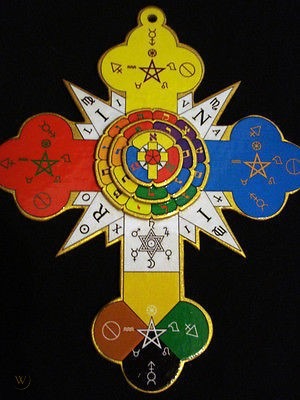
The hand crafting of beautiful instruments is a signal to the self of one’s commitment to the art and possibly to the powers that be. When you have given the crafting of an object your total attention, patience, and every ounce of craftsmanship, the final product will radiate this fact.
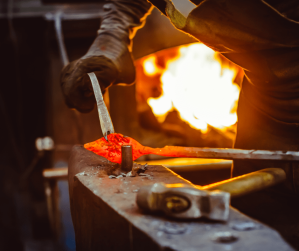
The Ritual Tools of the Satanist
Satanic ritual also has its staples when it comes to magical tools. In 1969 with the publication of The Satanic Bible, a standard for ritual tools was established for Satanists.
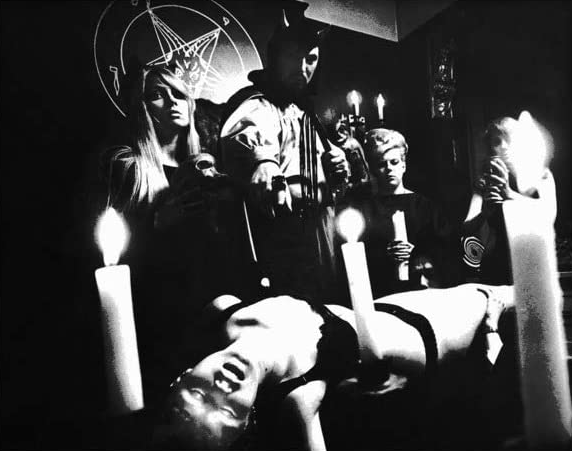
The Altar: The platform upon which the symbolic acts of ritual magic are enacted. In LaVey’s tradition there was a twist; a nude woman perched on a platform was used as the standard ritual altar (LaVey did not create the living altar, he borrowed it along with many other ideas.). The symbolism of flesh is obvious, as is the potential for inspiring lustful impulses from participants that can be directed to the goal of the magical operation.
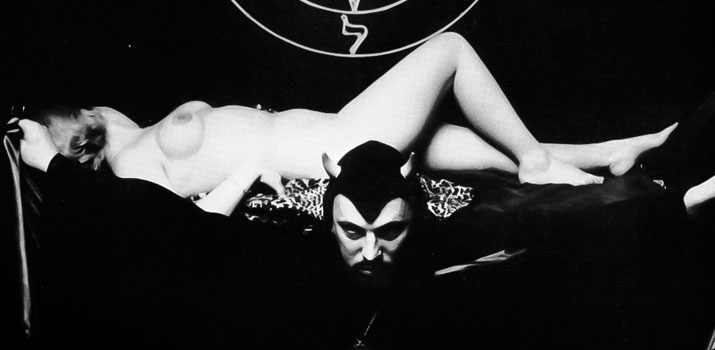
The weapons/tools themselves included:
The Sword: symbolic of aggression and triumph.
Symbol of Baphomet resting on the wall above the altar, represents the Powers of Darkness.
The Bell which is used to signal the beginning and ending of the ritual.
The Chalice and Elixir are used to further stimulate the magician.
The Phallus is the Satanic Ritual version of the wand and of course represents the male sexual force.
Other tools like the gong were used to dial up the drama of the ritual performance.
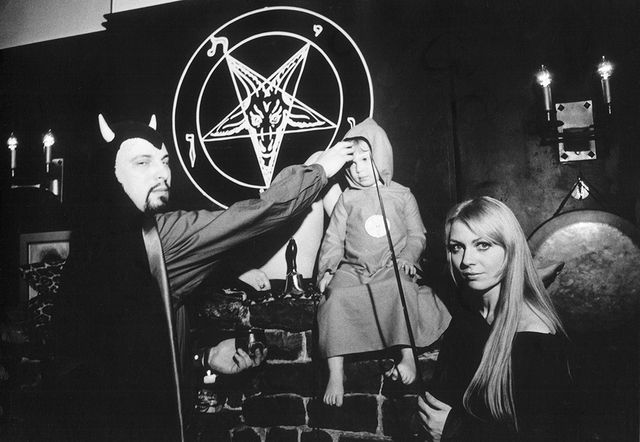
The Tools of Black Magic
The works of the Left-Hand Path are are so diverse it’s difficult to know where to start. I think that it’s safe to say that most black magicians are very eclectic in their approach to magic. Using different traditions at different times and hopefully developing their own along the way.
For example in the Works of Darkness, E.A. Koetting describes the altar, ritual dagger, and chalice as being essential.
The Temple of Set introduced, among other things, a central source of light for ritual to represent the Black Flame of the magician. Historically I have used the wooden chalice pictured below for this purpose. Inside the bowl would be a can of Sterno.
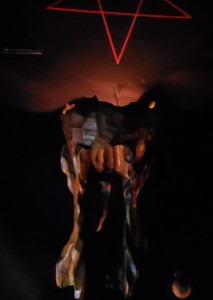
Don Webb’s The Seven Faces of Darkness, distilled a system of black magic from the Greek Magical Papyri. Accordingly some of the unique magical tools include:
- A Symbol of Set-Typhon
- A Red Lamp
- Black or Red Robe
- Divination Bowl, etc.
Beyond that Webb explores the preparation and maintenance of the body and features of the psyche as a magical tools. More on that shortly.
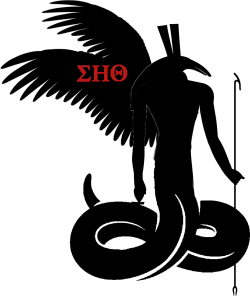
It is worth mentioning that workings drawn from historical traditions are well served by authenticity. Taking the time to recreate to the best of your ability the magical tools of those nearly forgotten magical traditions of the past is in my opinion vitally important to successfully experiencing the magic as it was intended. It plugs you into the historical workings of the magicians that operated within that tradition, which will not only empowers your working in a practical sense, but also opens up opportunities for important insights and noesis from those traditions.
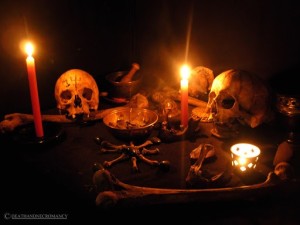
The Purpose of Tools of Black Magic
The black magician might use any number of ritual tools for a particular working, or none at all. It is a highly personal and situational decision.
When a ritual tool is used in black magic, it is usually for one or more of the following reasons:
Technical: The tool is called for in the proper recreation of a historical system.
Nostalgia: The tool has a positive history for the magician.
Utility: The tool has been granted certain powers that are more easily called upon with the tool.
Initiatory: Through mysterious or otherwise magical circumstances, the tool is intimately tied to the initiatory trajectory of the magician.
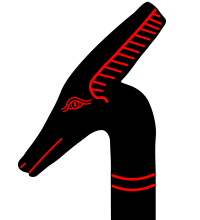
Acquiring Black Magic Tools
In general black magical tools should be acquired in one of the following ways:
- Gifted from a master/teacher/sacred love: These can be magical tools/objects of tremendous importance, representing an unbroken legacy of initiatory wisdom.
- Discovered under mysterious circumstances: Perhaps a walk through a segment of woods that you never travel yields a piece of antiquity that calls to you. Upon inspection it reveals itself to be precisely what you have been looking for to serve as a the capstone of a ritual staff that you have left unfinished for years.
- Crafted with great love for a specific purpose: Most magical tools will be had in this manner. The trick is to pour yourself into its every detail.
You Are Right Here
We have made a brisk run through some of the magical tools used in modern magical traditions both RHP and LHP, and hopefully offered some information on why they are used. Now I would like to discuss the magical tools that are standard to my practice of black magic.
The Lamen: A ritual medallion that serves as a mark of the quest for sovereignty, and a footing towards success in the area of self-rulership. In my personal neo-tradition the lamen represents a specific stage of accomplishment in the quest for personal sovereignty. My personal lamen is a simple inverted pentagram without ornamentation.
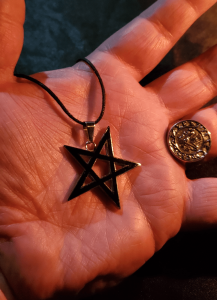
The Dagger: The ritual dagger serves the traditional functions of both the wand and dagger for the external direction of the magician’s will and interaction with the aether. The blade and handle should be simple, and for magician’s that find the qualities of iron difficult to work with, silver is suggested. My dagger is a simple cubed blade design forged from a single piece of iron. The Handle was fashioned by twisting the steel tie and then folding it back on itself. Finally I coated the handle with heavy resin, colored with Musou black paint.
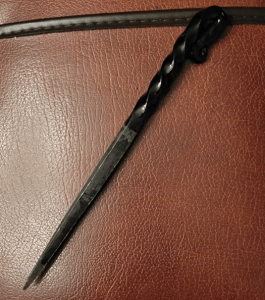
The Grimoire: Your intimate record of all your magical workings, relevant ideas, experiences, and the chronicle of your initiation. This is the most valuable external magical tool. My current grimoire is the most recent volume in a library that stretches back 30 years. The contents of my personal grimoires are the subjects of this digital grimoire.
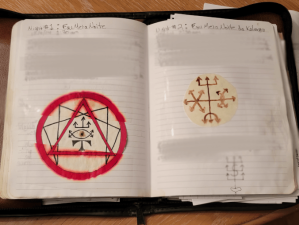
The Altar: My primary altar is a simple raised platform that is carved and painted with symbols of significant magical exploits, life accomplishments, and points of initiatory interest. The altar is the focal point of your working. Taking the time to either find or design something that feels magical to you is essential. I usually cover my altars with a simple black altar cloth.
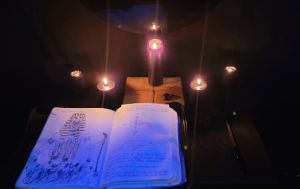
In addition to the few external tools I use, I have developed a system of internal magical tools that span the various emanations of the soul. Additionally I have developed a technique for reviewing and evoking the momentum associated with significant initiatory and life accomplishments. These internal magical tools can produce powerful magical effects, and will be treated at length in a subsequent article.
I hope you enjoyed this entry.
-Adam


